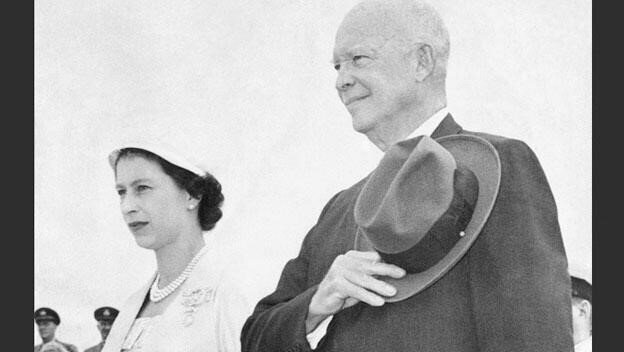I Like Ike - Eisenhower and the Veto
Background
One main principle of the U.S. Constitution is the separation of powers. Each branch of government (Executive, Legislative, and Judicial) can serve as a check on the other, preventing excessive power in any one branch. The Presidential Veto is an example of separation of powers. The President must sign laws passed by Congress. If the President vetoes the bill (does not sign it into law), it takes a two-thirds (67%) vote in both the House and Senate to override the President and pass the bill.
Eisenhower Vetoes
During his eight-year Presidency (1953 – 1961), President Eisenhower vetoed 181 bills, the fourth highest of any President. Only two were overridden. Almost 100 of those vetoes were laws directed to aid single individuals (known as 'private laws').
Some examples of Vetoed Private Laws:
Harold Davis wanted $10,000 as compensation for permanent disability resulting from the Japanese bombing a Navy base in 1942. Two problems – first, he waited for seven years to file a claim, and second, administrative hearings determined that his disability was not related to the bombing. Congress passed a law awarding him compensation anyway. Eisenhower vetoed the bill.
Harold Davis Veto
In 1953, Fred Hines wanted $778.78 to pay for the costs of private medical treatment not related to his military service in the Spanish-American war back in 1898. At the time, he was aware that his option for no-cost treatment was limited to V.A. hospitals. Eisenhower vetoed the bill indicating that approving this bill would open the Government up to payment liabilities for millions of veterans.
Here is one that seems fair, but Eisenhower vetoed it. An Internal Revenue Service (IRS) unit was performing a high-speed chase of a whiskey bootlegger. The alleged bootlegger crashed into the S.H. Prather’s car, causing personal injuries and destroying the vehicle. Eisenhower stated in his veto message: “The misfortune suffered by this family as a result of the automobile accident, for which they were in no manner responsible, is most lamentable.” He understood that the bootlegger was not in a position to provide compensation, but stated: “Enactment of the bill would…would create a dangerous precedent which might set in motion a chain of endless requests for the payment of damages by the Government arising out of accidents in which law-enforcement officers may have been… involved.” The veto in question occurred in 1954; I’m not sure how these situations are handled today.
Fight over housing bill – 1959/1960
Eisenhower vetoed a 1959 public housing bill: “…Congress has…presented me with a bill so excessive in the spending it proposes, and so defective in other respects, that it would do far more damage than good.”
Congress passed a modified version. Eisenhower vetoed it again: “Clearly, this bill, like its predecessor, goes too far. It calls for the spending of more than 1 3/4 billion of taxpayers' dollars for housing and related programs over and above the vast expenditures to which the Federal Government is already committed for these purposes.”
The vetoes became an issue in the 1960 election campaign narrowly won by John F. Kennedy over Richard Nixon. Nixon wanted Eisenhower to sign the bills. He believed the public supported the bills, and the vetoes would hurt his campaign.
Overridden Vetoes
Congress overrode two of IKE's vetoes. One was the "Postal and Federal Employees' Salary Increase Acts of 1960." Eisenhower stated, "This hastily drawn bill violates every concept of fairness, every rule of reason and logic. Were this measure to become law, the already conspicuous unfairness and discrimination in our antiquated Federal pay system would be greatly intensified." He went on to say that the pay increase gave workers more compensation than equivalent private-sector workers and was well over inflation. 83% of the House and 75% of the Senate voted against Eisenhower, easily exceeding the 66% override threshold
Congress passed a public works bill in 1959, which Eisenhower vetoed. He said: "This tremendous expansion in Government expenditures… brings into sharp focus how Congress by action in one-year builds increases into the Federal budget in future years. For example, although the cost of the unbudgeted projects in H.R. 7509 will be relatively small in fiscal 1960-about $50 million, their ultimate cost will be more than $800 million." He further stated:“ I believe that the American people look to the Government to see that their tax money is spent only on necessary projects and according to a priority as to urgency that does not weaken our financial structure nor add to the tremendous debt burden that posterity will have to pay.” A few weeks later, Congress passed it again with minor reductions in expenses which Ike again vetoed. This time Congress overrode his veto.
Believe it or not, there was a time when the Government was concerned about balancing the budget. Eisenhower ran budget surpluses in three years of his eight year Presidency, in part due to his use of vetoes. The country has run a deficit in 55 years of the 60 years since he left office. Who says there isn’t bipartisanship in this country today? Both parties now run large deficits.
Eisenhower was popular throughout his administration, winning both his initial election and re-election by wide margins. Historians rank him as one of our best Presidents.
Click for Part 1, Part 2, Part 3, Part 4, Part 5, Part 6, Part 7, and Part 8 of this series)
(to be continued)
IKE and Queen Elizabeth at 1959 dedication of Saint Lawrence Seaway
Meanwhile, for you fans of royalty and having nothing to do with vetoes, here is a picture of President Eisenhower and Queen Elizabeth at the 1959 Saint Lawrence Seaway dedication. The Seaway connected the Atlantic Ocean to the Great Lakes.
And a short video, click here.


